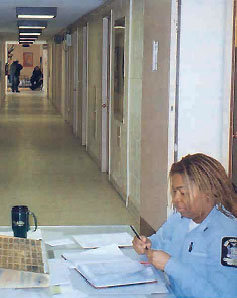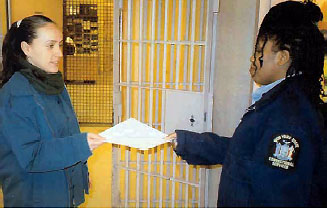TaconicNestled in the affluent Westchester County community of Bedford Hills, Taconic has been assigned several varied but intertwined missions over the past century. Its roots date back to 1901 when it opened as the New York State Reformatory for Women between the ages of 15 and 30. In 1913, the Bureau of Social Hygiene established a laboratory next door, which evaluated reformatory residents for the investigation and treatment of what was then termed “feeblemindedness.” The then-Department of Correction took over the reformatory in 1926 and, in 1933, merged it with the newly-opened Bedford Hills Correctional Facility for women. For the next four decades, the reformatory operated as part of Bedford Hills, still the state’s only maximum-security prison for females. In 1973, Taconic began operations as an autonomous medium-security prison. But let’s begin at the Beguine: it was in 1913 that the laboratory dealing with the issue of “feeblemindedness” was opened. Its founders, including John D. Rockefeller Jr., proposed to have each person committed to the reformatory studied by experts from the physical, mental, social and moral disciplines. The view was that they would be able to recommend a treatment regime most likely to bring about reformation of the individual or, if that was not probable, to recommend permanent custodial care. The bureau added a psychopathic hospital to its laboratory in 1916. The Bedford Hills site of 71 acres and attendant buildings cost about $200,000. The physical plant, along with its staff of scientific experts and the best equipment available, was put at the disposal of the reformatory at a rental rate of $1 a year. The state permitted women committed to the reformatory to be quarantined and examined there. In 1920, the state authorized the lease or rental of the laboratory and established a division for mentally defective delinquent women at the reformatory. The state purchased the buildings that were known as the “Rockefeller Group” three years later.
Through the reorganization of government in 1926, the reformatory at Bedford Hills became part of the then-Department of Correction. The duties of the Commission on Prisons were turned over to the new Commission of Corrections. That same year the Legislature decided to co-locate a prison for women at the Bedford Hills site. It appropriated $225,000 for remodeling and reconditioning all the buildings. Some of those funds were also used to construct a general dining hall, kitchen, auditorium and school. The women’s prison was to be a distinctively separate unit: the prison inmates had no contact with the reformatory inmates, the latter of whom were eventually transferred to other facilities around the state. The Commissioner of Correction was empowered to transfer the female prisoners from Auburn prison as soon as the new Bedford Hills institution was ready to receive them. In 1932, the New York State Reformatory for Women became the Westfield State Farm. The complex would include the new women’s prison under construction at the time. The first group of 50 prisoners slated to occupy the new prison left Auburn on June 26, 1933, aboard a special train. At the Bedford Hills train station, the women were met by the superintendent, state police, guards and matrons, and were taken to their new home. During 1971-72, Bedford Hills was a single correctional facility with separate male and female units. In 1973 the male inmates were transferred and their unit closed in June. In December, that unit reopened as Taconic. A small cadre of inmates was used to renovate the existing buildings with painting, plumbing and electrical work among their duties. The concept at the time was to create a college for the inmate population. But that idea was abandoned in April 1974 and today Taconic continues its mission as a medium security facility. Taconic offers a full range of academic education, some vocational training, counseling services and volunteer services programming. They include Adult Basic Education (ABE), Pre-GED and English as a Second Language. . . . Taconic has received national acclaim for its Comprehensive Alcohol and Substance Abuse Treatment (CASAT) program. Of the 464 beds at the facility, 215 are dedicated for CASAT and relapse recovery.
That tends to reflect the reality that 71 percent of the population at Taconic has been diagnosed with alcohol or substance abuse problems. For an inmate to be considered for the Department’s CASAT program, which is also offered at six other facilities for male inmates, they must have a history of alcohol and substance abuse problems; be between 10 and 24 months to their earliest possible release date; receive presumptive work release approval from Central Office, and be of medium- or minimum-security classification. Inmates convicted of committing violent acts are excluded from participating in the program. CASAT is an intensive and multipronged treatment program. . . . The goals of CASAT include:
Another important service available to Taconic inmates is the Counseling, AIDS, Resource and Education (CARE) program. CARE is an HIV/AIDS peer counseling group that provides a forum for group and individual counseling, HIV antibody testing, support groups, transitional services, outreach work and discharge planning. . . . CARE provides benefits to others besides those enrolled in the program. Every third week in July CARE holds its annual AIDS Awareness Day. Agencies from throughout the community that deal with HIV/AIDS issues are invited into the facility to meet with all interested inmates, share advice and hand out literature. . . . Taconic also offers its inmates the opportunity to participate in a comprehensive work-study program called Project Does to qualify for employment in the food services industry. The program emphasizes nutrition, personal hygiene, health and safety procedures, accident prevention, housekeeping and sanitation, menu planning, cost analysis and control, food preparation, storage and service.
It is a challenging and intensive 16-week program in which Taconic’s food administrator works closely with each inmate. Those who successfully complete the course receive written certification which could assist them in getting a job in the food service industry upon their release; many former inmates who completed the program have done just that. The certificate also qualifies the inmate for various food service positions within DOCS. Taconic also offers its inmates a general business program to provide them with the basic skills needed to get an office job upon their release from prison. . . . Taconic inmates also have access to pre- and post-release services in Spanish.
One of Taconic’s other claims to fame is that it’s one of two prisons in the state that offers an on-site nursery program for selected inmate mothers and their infant children, a valuable bonding program that’s believed to have helped reduce recidivism. Taconic’s nursery program started in 1990 and is an outgrowth of a similar program at Bedford Hills. There is space at Taconic for 16 inmates and their babies on the second floor of a housing unit for inmates enrolled in the facility’s CASAT program. Taconic’s nursery program is specifically designed for mothers who’ve been diagnosed with alcohol and substance abuse problems; its population count varies. Across the street at Bedford Hills, there is nursery space available for 32 inmates and their babies on the second and third floors of the building which houses the facility’s infirmary. The population of the Bedford Hills nursery at any given time also varies. Correction Law Section 611 permits the inmates to keep their babies at either facility for 12 months, with a possible extension of up to 18 months if there is a reasonable assurance the inmate will be released from prison within that time. Inmates who will be incarcerated for more than 18 months from the time their baby is born must relinquish the child to his or her father, family members or another party when the baby turns a year old.
New inmate transfers to DOCS who had their infants housed with them in city or county jails with nurseries can also apply to bring their infants to Bedford Hills provided they are less than a year old. Those transfers are subject to a case-by-case review. At each nursery, the inmates and their babies stay together in single rooms, double-occupancy rooms or dormitories with other inmates and their babies. At Taconic, inmates typically remain with their infants on a full-time basis for up to two weeks; at Bedford Hills, the time limit is up to six weeks. After the respective full-time-custody time parameters have been reached, the inmate mothers are required to participate in regular programming during the day, at which time the babies are cared for at on-site child care centers. The Taconic child care center is coordinated by staff from Hour Children, an outside agency, and inmates; the Bedford Hills child care center is operated by Catholic Charities under a contract with DOCS. The inmate mothers and their babies at both facilities are then reunited after programming. Not all inmates with infant children can participate in the nursery program. Participation can be denied if the inmate has:
Serious concerns about the health of the baby also could bar participation because the nursery program is established as a “well-care” program. Although there is medical staff on site to handle the health care needs of the babies, there are no on-site facilities for infants with serious health problems who need sophisticated, long-term medical care.
There are several advantages associated with the program. Studies have shown that inmates with strong family ties return to prison at a lower rate than inmateswithout those ties. Inmates enrolled in the nursery program also have a lower incidence of disciplinary problems than inmates in general population, meaning enhanced security. In addition, many of the inmate mothers are products of broken homes and know little about basic parenting skills. Through the help and support of others trained in that field, they’re able to learn those basic parenting skills. The program also benefits the infant. The baby can be with their mother during a crucial period of development and can forge an important bond. And through their daily interaction with other children and their mothers in a communal setting, the infants tend to exhibit a very positive social development. A Correction Officer and nursery manager help staff the nurseries. There are also pediatric nurses assigned to the nurseries. The Department also has a contract with the Westchester County Medical Center to provide regular pediatric clinics at each nursery and some prenatal care. Pediatricians from the center do routine checkups and immunizations and assess overall development and special problems. The pediatricians are on call 24 hours a day. Volunteers are an integral part of the daily operations at Taconic. There are 275 registered volunteers from the local community who come to the facility on a regular basis to meet and speak with the inmates. . . . The Hour Children program, headquartered in Long Island City, has long been cited for its multiple successes. The parenting program covers a variety of topics, from domestic violence to maintaining family ties, from providing employment skills to advising inmates how to navigate the family court system. . . . Return to menu listing NYCHS excerpts of DOCS|TODAY Facility Profiles.
|







